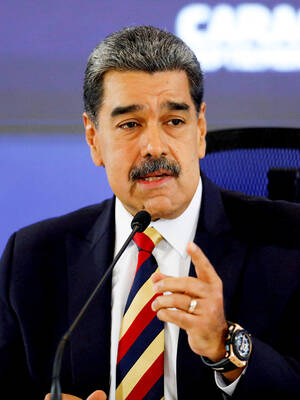Iran and world powers on Tuesday held what they described as “constructive” talks, and agreed to form working groups to discuss the sanctions that Washington might lift and the nuclear curbs Tehran might observe as they try to revive the 2015 nuclear deal.
While the US and Iran have said that they do not expect any quick breakthroughs, and Tehran for now rejects face-to-face talks, both nations and the EU described the talks in positive terms.
European intermediaries have started shuttling between Iranian and US officials in Vienna as they seek to bring them back into compliance with the accord, which lifted sanctions on Iran in return for curbs to its nuclear program.

Photo: AFP
Former US president Donald Trump withdrew from the deal in 2018, prompting Iran to steadily overstep the accord’s limits on its nuclear program designed to make it more difficult to develop an atomic bomb — an ambition that Tehran denies having.
Tuesday’s talks included a meeting of the remaining parties to the original deal: Iran, China, France, Germany, Russia and the UK in a group called the Joint Commission that is chaired by the EU.
The US did not attend.
“Constructive Joint Commission meeting. There’s unity and ambition for a joint diplomatic process with two expert groups on nuclear implementation and sanctions lifting,” EU diplomat Enrique Mora wrote on Twitter.
A source familiar with the matter said that diplomats briefed the US delegation after their talks with Iran and the wider group.
The two expert-level groups have been given the task of marrying lists of sanctions that the US could lift with nuclear obligations Iran should meet, and reporting back tomorrow, when the Joint Commission is to meet again.
“The talks in Vienna were constructive,” Iranian Deputy Minister of Foreign Affairs Abbas Araghchi told Iranian state television.
In Washington, US Department of State spokesman Ned Price told reporters: “It is a welcome step, it is a constructive step, it is a potentially useful step,” even as he repeated the US expectation that the indirect talks would be “difficult.”
A resolution of the nuclear issue could help ease tensions in the Middle East, notably between Iran and Israel, as well as between Tehran and US Sunni Arab allies, such as Saudi Arabia, who fear the possibility of Shiite Iran getting nuclear arms.
In a possible sign of such strains, an Iranian cargo ship came under attack in the Red Sea, al-Arabiya TV reported, citing unnamed sources, and news agency Tasnim said that the vessel was targeted by a limpet mine.
Al-Arabiya cited its sources as saying that the ship was attacked off Eritrea and was affiliated with Iran’s Revolutionary Guards, but gave no evidence to support the assertion.

VENEZUELAN ACTION: Marco Rubio said that previous US interdiction efforts have not stemmed the flow of illicit drugs into the US and that ‘blowing them up’ would US President Donald Trump on Wednesday justified a lethal military strike that his administration said was carried out a day earlier against a Venezuelan gang as a necessary effort by the US to send a message to Latin American cartels. Asked why the military did not instead interdict the vessel and capture those on board, Trump said that the operation would cause drug smugglers to think twice about trying to move drugs into the US. “There was massive amounts of drugs coming into our country to kill a lot of people and everybody fully understands that,” Trump said while hosting Polish President

A French couple kept Louise, a playful black panther, in an apartment in northern France, triggering panic when she was spotted roaming nearby rooftops. The pair were were handed suspended jail sentences on Thursday for illegally keeping a wild animal, despite protesting that they saw Louise as their baby. The ruling follows a September 2019 incident when the months-old feline was seen roaming a rooftop in Armentieres after slipping out of the couple’s window. Authorities captured the panther by sedating her with anesthetic darts after she entered a home. No injuries were reported during the animal’s time on the loose. The court in the

Japan yesterday heralded the coming-of-age of Japanese Prince Hisahito with an elaborate ceremony at the Imperial Palace, where a succession crisis is brewing. The nephew of Japanese Emperor Naruhito, Hisahito received a black silk-and-lacquer crown at the ceremony, which marks the beginning of his royal adult life. “Thank you very much for bestowing the crown today at the coming-of-age ceremony,” Hisahito said. “I will fulfill my duties, being aware of my responsibilities as an adult member of the imperial family.” Although the emperor has a daughter — Princess Aiko — the 23-year-old has been sidelined by the royal family’s male-only

For more than a century, the fate of the dazzling Darya-e-Noor diamond has been sealed inside a bank vault — a mystery that haunts Khawaja Naim Murad, great-grandson of the last prince, or nawab, of Dhaka. Locked away in 1908, were the family’s heirlooms lost during the violence at the end of British rule in 1947? Did they survive Bangladesh’s war of independence in 1971 and the string of coups that followed, or are they still safe, dusty, but untouched? Many suspect that the jewels are long gone and officials at the state-run bank hesitate to simply open the vault, fearing that they